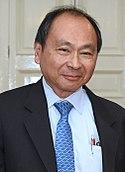Francis Fukuyama Quote
Many people today inside and outside the region are aware that many regimes, particularly in the Arab world, are cruel dictatorships unconstrained by any sense of higher law or justice.6 Westerners often think that the fusion of church and state is intrinsic to Islam while being foreign to Christian Europe, and that the kind of theocratic regime set up in Iran after the 1979 revolution somehow constitutes a reversion to a traditional form of Muslim rule. None of this is accurate. The emergence of modern Muslim dictatorships is a result of the accidents of the region’s confrontation with the West and subsequent transition to modernity. Political and religious authority were frequently united in Christian Europe. In the Muslim world, they were effectively separated through long historical periods. Law played the same function in Muslim lands that it did in Christian ones: acting as a check—albeit weaker—on the power of political rulers to do as they pleased. Rule of law is basic to Muslim civilization, and in fact defines that civilization in many respects.
Many people today inside and outside the region are aware that many regimes, particularly in the Arab world, are cruel dictatorships unconstrained by any sense of higher law or justice.6 Westerners often think that the fusion of church and state is intrinsic to Islam while being foreign to Christian Europe, and that the kind of theocratic regime set up in Iran after the 1979 revolution somehow constitutes a reversion to a traditional form of Muslim rule. None of this is accurate. The emergence of modern Muslim dictatorships is a result of the accidents of the region’s confrontation with the West and subsequent transition to modernity. Political and religious authority were frequently united in Christian Europe. In the Muslim world, they were effectively separated through long historical periods. Law played the same function in Muslim lands that it did in Christian ones: acting as a check—albeit weaker—on the power of political rulers to do as they pleased. Rule of law is basic to Muslim civilization, and in fact defines that civilization in many respects.
Related Quotes
About Francis Fukuyama
Fukuyama is best known for his book The End of History and the Last Man (1992), which argues that the worldwide spread of liberal democracies and free-market capitalism of the West and its lifestyle may signal the end point of humanity's sociocultural evolution and political struggle and become the final form of human government, an assessment met with numerous and substantial criticisms. In his subsequent book Trust: Social Virtues and Creation of Prosperity (1995), he modified his earlier position to acknowledge that culture cannot be cleanly separated from economics. Fukuyama is also associated with the rise of the neoconservative movement, from which he has since distanced himself.
Fukuyama has been a senior fellow at the Freeman Spogli Institute for International Studies since July 2010 and the Mosbacher Director of the Center on Democracy, Development and the Rule of Law at Stanford University. In August 2019, he was named director of the Ford Dorsey Master's in International Policy at Stanford.
Before that, he served as a professor and director of the International Development program at the School of Advanced International Studies of Johns Hopkins University. Previously, he was Omer L. and Nancy Hirst Professor of Public Policy at the School of Public Policy at George Mason University.
He is a council member of the International Forum for Democratic Studies founded by the National Endowment for Democracy and was a member of the Political Science Department of the RAND Corporation. He is also one of the 25 leading figures on the Information and Democracy Commission launched by Reporters Without Borders. In 2024 he received the Riggs Award for Lifetime Achievement in International and Comparative Public Administration.
